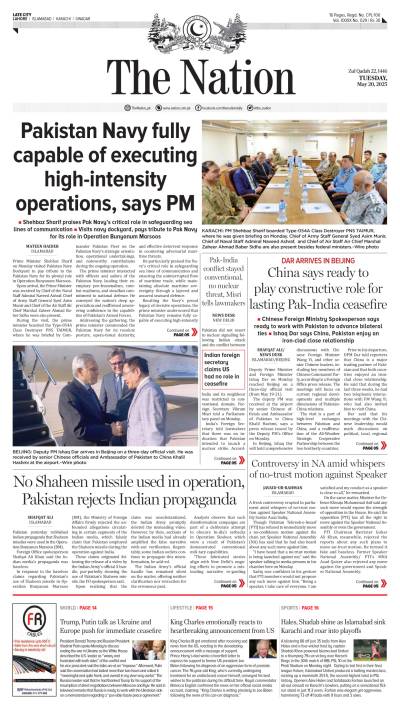KARACHI - A high-level delegation of the United Nations Children’s Fund (UNICEF) Pakistan called on the Chief Secretary (CS) Sindh Asif Hyder Shah to discuss Sindh province’s comprehensive five-year roadmap aimed at tackling the alarming number of out-of-school children and adolescents.
The meeting marked a significant milestone in Sindh’s commitment to implementing the National Education Emergency declared in May 2024 and finalizing its Multi-Sectoral Roadmap for Out-of-School Children and Adolescents (OOSC/A) for the period of July 2025 to June 2030.
The Chief Secretary and UNICEF delegation reviewed the roadmap’s strategic objectives, which aim to reduce the number of out-of-school children and adolescents in Sindh by 50 percent over the next five years.
The roadmap identifies and addresses the range of structural, socio-economic, and cultural barriers that hinder access to education. The roadmap has been developed through collaborative input from multiple departments including School Education, Health, Social Welfare, Local Government, Finance, Planning and Development, Public Health Engineering, and the Directorate of Empowerment of Persons with Disabilities (DEPD).
It adopts a comprehensive life-cycle approach, linking education with healthcare, nutrition, child protection, and social services beginning from maternal and prenatal care and extending through early childhood to adolescence and employability.
The Chief Secretary Asif Hyder Shah reaffirmed the provincial government’s unwavering commitment to the roadmap and highlighted the need for cross-sectoral leadership and integration to achieve sustainable results. Speaking on the multifaceted nature of the issue, he stated,“The crisis of out-of-school children is not solely an education issue—it is, in fact, a deeply rooted, multi-sectoral challenge that begins even before a child is born.
It starts with the health and nutrition of the mother, continues with timely birth registration, and is influenced by poverty, social norms, child protection, and access to basic services. When a child is not in school, it often reflects systemic gaps across several sectors—healthcare, nutrition, social protection, civil registration, and community support systems.
If we are to make meaningful progress, we must look beyond the classroom and adopt a holistic, life-cycle approach that integrates interventions from pre-conception through early childhood to adolescence. This is why the Government of Sindh is committed to treating the out-of-school children agenda not as the responsibility of the Education Department alone, but as a shared provincial priority demanding unified action across all departments and sectors. Only through collective commitment can we ensure that every child is not only enrolled in school but has the opportunity to thrive and succeed.” The discussion placed special emphasis on addressing social and behavioral challenges that obstruct children’s access to education. Consultations and research led by UNICEF revealed how deeply entrenched socio-cultural factors including early marriages, child labor, corporal punishment, and prevailing gender norms contribute to the dropout and non-enrollment rates, especially among girls.
The Chief Secretary acknowledged these barriers and reiterated the government’s determination to enforce relevant legislation such as the Sindh Child Marriage Restraint Act, eliminate corporal punishment in schools, and initiate widespread community mobilization to bring about behavioral change at the grassroots level.
The UNICEF delegation praised the Government of Sindh for its inclusive and evidence-based approach, which places equity and coordination at the core of its strategy. They underscored the importance of real-time data systems and district-specific planning to identify, enroll, and retain out-of-school children particularly in flood-prone and disadvantaged regions where school continuity remains a major challenge.
UNICEF also reaffirmed its commitment to providing technical assistance, supporting monitoring mechanisms, and mobilizing development partnerships to back the province’s ambitious roadmap.
The meeting was attended by the UNICEF Pakistan Representative Prem Bahadur Chand, Abeer Maqbool, and Kamal Asghar. Senior officials from key provincial departments were also present including Secretaries of School Education, Health, Public Health Engineering, Social Welfare, Women Development, DEPD, and other relevant stakeholders.





